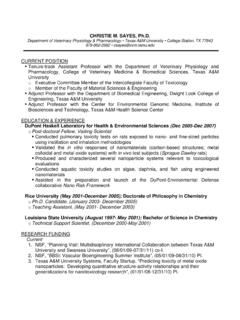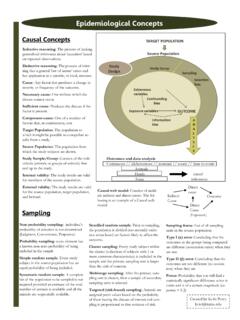Transcription of Principles of Veterinary Medical Ethics of the AVMA
1 Principles of Veterinary Medical Ethics of the AVMA Bold print states the Principles , standard print explains or clarifies the Principle to which it applies) I. Introduction A. Veterinarians are members of a scholarly profession who have earned academic degrees from comprehensive universities or similar educational institutions. Veterinarians practice the profession of Veterinary medicine in a variety of situations and circumstances. B. Exemplary professional conduct upholds the dignity of the Veterinary profession.
2 All veterinarians are expected to adhere to a progressive code of ethical conduct known as the Principles of Veterinary Medical Ethics (the Principles ). The basis of the Principles is the Golden Rule. Veterinarians should accept this rule as a guide to their general conduct, and abide by the Principles . They should conduct their professional and personal affairs in an ethical manner. Professional Veterinary associations should adopt the Principles or a similar code as a guide for their activities. C. Professional organizations may establish Ethics , grievance, or peer review committees to address ethical issues.
3 Where such committees exist, the AVMA Peer Review Procedure Manual (Grievance Resolution) may be useful. Local and state Veterinary associations should also include discussions of ethical issues in their continuing education programs. 1. Complaints about behavior that may violate the Principles should be addressed in an appropriate and timely manner. Such questions should be considered initially by Ethics , grievance, or peer review committees of local or state Veterinary associations, when they exist, and/or when appropriate, state Veterinary Medical boards.
4 Members of local and state committees are familiar with local customs and circumstances, and those committees are in the best position to confer with all parties involved. The Judicial Council may address complaints, prior to, concurrent with, or subsequent to review at the state or local level, as it deems appropriate. 2. All veterinarians in local or state associations and jurisdictions have a responsibility to regulate and guide the professional conduct of their members. 3. Colleges of Veterinary medicine should stress the teaching of ethical and value issues as part of the professional Veterinary curriculum for all Veterinary students.
5 4. The National Board of Veterinary Medical Examiners is encouraged to prepare and include questions regarding professional Ethics in the National Board Examination. D. The AVMA Judicial Council is charged to advise on all questions relating to interpretation of the Bylaws, all questions of Veterinary Medical Ethics , and other rules of the Association. The Judicial Council should review the Principles periodically to ensure that they remain complete and up to date. II. Professional behavior A. Veterinarians should first consider the needs of the patient: to relieve disease, suffering, or disability while minimizing pain or fear.
6 B. Veterinarians should obey all laws of the jurisdictions in which they reside and practice Veterinary medicine. Veterinarians should be honest and fair in their relations with others, and they should not engage in fraud, misrepresentation, or deceit. 1. Veterinarians should report illegal practices and activities to the proper authorities. 2. The AVMA Judicial Council may choose to report alleged infractions by nonmembers of the AVMA to the appropriate agencies. 3. Veterinarians should use only the title of the professional degree that was awarded by the school of Veterinary medicine where the degree was earned.
7 All veterinarians may use the courtesy titles Doctor orVeterinarian. C. It is unethical for veterinarians to identify themselves as members of an AVMA recognized specialty organization if such certification has not been awarded and maintained. D. It is unethical to place professional knowledge, credentials, or services at the disposal of any nonprofessional organization, group, or individual to promote or lend credibility to the illegal practice of Veterinary medicine. E. Veterinarians may choose whom they will serve.
8 Both the veterinarians and the client have the right to establish or decline a Veterinarian-Client-Patient Relationship (See Section III) and to decide on treatment. The decision to accept or decline treatment and related cost should be based on adequate discussion of clinical findings, diagnostic techniques, treatment, likely outcome, estimated cost, and reasonable assurance of payment. Once the veterinarians and the client have agreed, and the veterinarians have begun patient care, they may not neglect their patient and must continue to provide professional services related to that injury or illness within the previously agreed limits.
9 As subsequent needs and costs for patient care are identified, the veterinarians and client must confer and reach agreement on the continued care and responsibility for fees. If the informed client declines further care or declines to assume responsibility for the fees, the VCPR may be terminated by either party. F. In emergencies, veterinarians have an ethical responsibility to provide essential services for animals when necessary to save life or relieve suffering, subsequent to client agreement. Such emergency care may be limited to euthanasia to relieve suffering, or to stabilization of the patient for transport to another source of animal care.
10 1. When veterinarians cannot be available to provide services, they should provide readily accessible information to assist clients in obtaining emergency services, consistent with the needs of the locality. 2. Veterinarians who believe that they haven't the experience or equipment to manage and treat certain emergencies in the best manner, should advise the client that more qualified or specialized services are available elsewhere and offer to expedite referral to those services. 3. Veterinarians who provide emergency services should send patients and continuation of care information back to the original veterinarians and/or other veterinarians of the owners' choice, as soon as practical.










